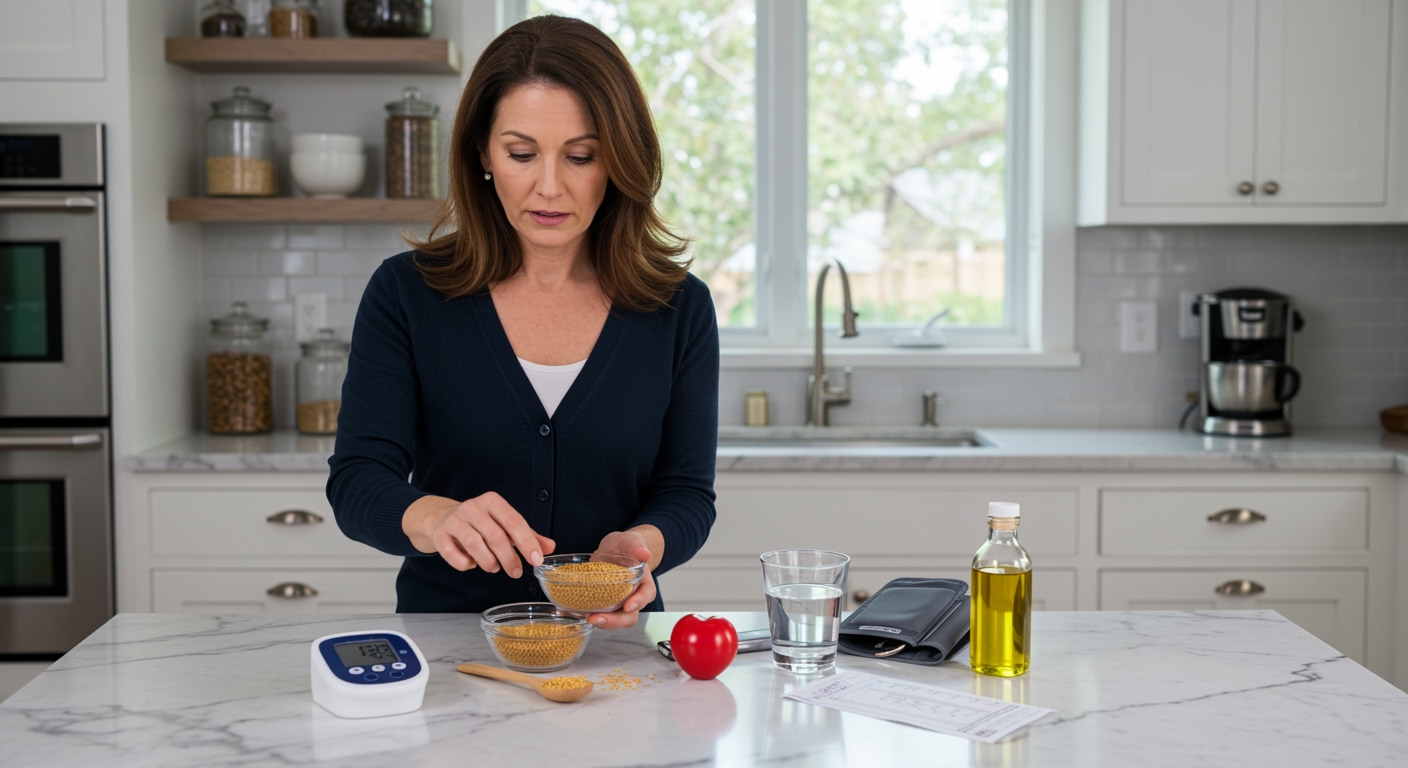✪ Key Takeaway: Hypotension patients can safely consume mustard seeds in normal cooking amounts as they do not significantly lower blood pressure.
Introduction
Your doctor just told you that your blood pressure runs low and you need to watch what you eat.
Now you are staring at your spice rack wondering if those tiny mustard seeds could make your hypotension worse.
Hi, I am Abdur, your nutrition coach and today I am going to explain exactly how mustard seeds affect your blood pressure and whether you need to avoid them.
Do Mustard Seeds Actually Lower Blood Pressure?
The short answer is no, mustard seeds do not significantly lower blood pressure in the amounts you typically use for cooking.
Research shows that mustard seeds contain compounds called glucosinolates which may have mild cardiovascular effects.
However, these effects are not strong enough to cause dangerous drops in blood pressure when you use normal cooking amounts.
A typical recipe calls for one to two teaspoons of mustard seeds, which contains only small amounts of these active compounds.
Your body processes these compounds quickly through your digestive system without creating lasting changes to your cardiovascular function.
Most studies that show blood pressure effects from mustard use concentrated extracts or oils in much larger quantities than you would ever consume in food.
✪ Fact: One teaspoon of mustard seeds contains less than 0.1% of compounds that could theoretically affect blood pressure.
What Makes Hypotension Patients Worry About Mustard Seeds?
The confusion comes from studies about mustard oil and its effects on heart health.
Some research suggests that mustard oil consumption may help reduce blood pressure in people with hypertension.
This information gets misinterpreted and creates fear among hypotension patients who think all mustard products will drop their blood pressure.
The reality is that mustard oil and mustard seeds have different concentration levels of active compounds.
Mustard oil is a concentrated extract while mustard seeds are whole foods with much lower potency.
Additionally, most studies showing blood pressure reduction used mustard oil as a cooking medium for months, not occasional seasoning amounts.
Your typical use of mustard seeds in curries, pickles, or tempering will not create the same effects as consuming large amounts of concentrated mustard oil daily.
✪ Pro Tip: Focus on overall dietary patterns rather than eliminating individual spices when managing hypotension.
How Much Mustard Seeds Are Safe For Low Blood Pressure?
Normal cooking amounts of mustard seeds are completely safe for people with hypotension.
This means using one to three teaspoons of mustard seeds in your daily cooking will not cause problems.
Your body can easily handle these amounts without any significant changes to your blood pressure readings.
The key is understanding that food amounts and supplement amounts are very different.
If you were taking concentrated mustard seed supplements or consuming tablespoons of mustard oil daily, then you might need to be more careful.
But using mustard seeds for tempering dal, making pickles, or adding flavor to vegetables poses no risk to your cardiovascular health.
In fact, mustard seeds provide beneficial nutrients like selenium, magnesium, and omega-3 fatty acids that support overall health.
✪ Note: Always consult your doctor before making major dietary changes if you have severe hypotension requiring medication.
What Should Hypotension Patients Focus On Instead?
Instead of worrying about mustard seeds, focus on proven strategies that actually help manage low blood pressure.
Increasing your salt intake moderately can help raise blood pressure naturally.
Drinking more water throughout the day helps maintain adequate blood volume which supports healthy blood pressure.
Eating smaller, more frequent meals prevents blood pressure drops that can happen after large meals.
Including foods rich in vitamin B12, folate, and iron helps prevent nutritional deficiencies that can worsen hypotension.
Regular physical activity, even light walking, helps improve circulation and supports healthy blood pressure regulation.
These evidence-based approaches will have much more impact on your blood pressure than avoiding harmless spices like mustard seeds.
✪ Pro Tip: Keep a food and symptom diary to identify your actual triggers rather than avoiding foods based on fear.
The Bottom Line
Hypotension patients do not need to avoid mustard seeds when used in normal cooking amounts.
Fear of food should never replace evidence-based nutrition decisions.
I would love to hear about your experience with managing low blood pressure through diet, so please share your questions or thoughts in the comments below.
References
At NutritionCrown, we use quality and credible sources to ensure our content is accurate and trustworthy. Below are the sources referenced in creating this article:
- The Heart Dietitian: Is Mustard Good for High Blood Pressure?
- PMC: Mustard Oil and Cardiovascular Health
- Medical News Today: What to Know About Mustard Oil
- Luke Coutinho: Mustard Seeds Benefits





